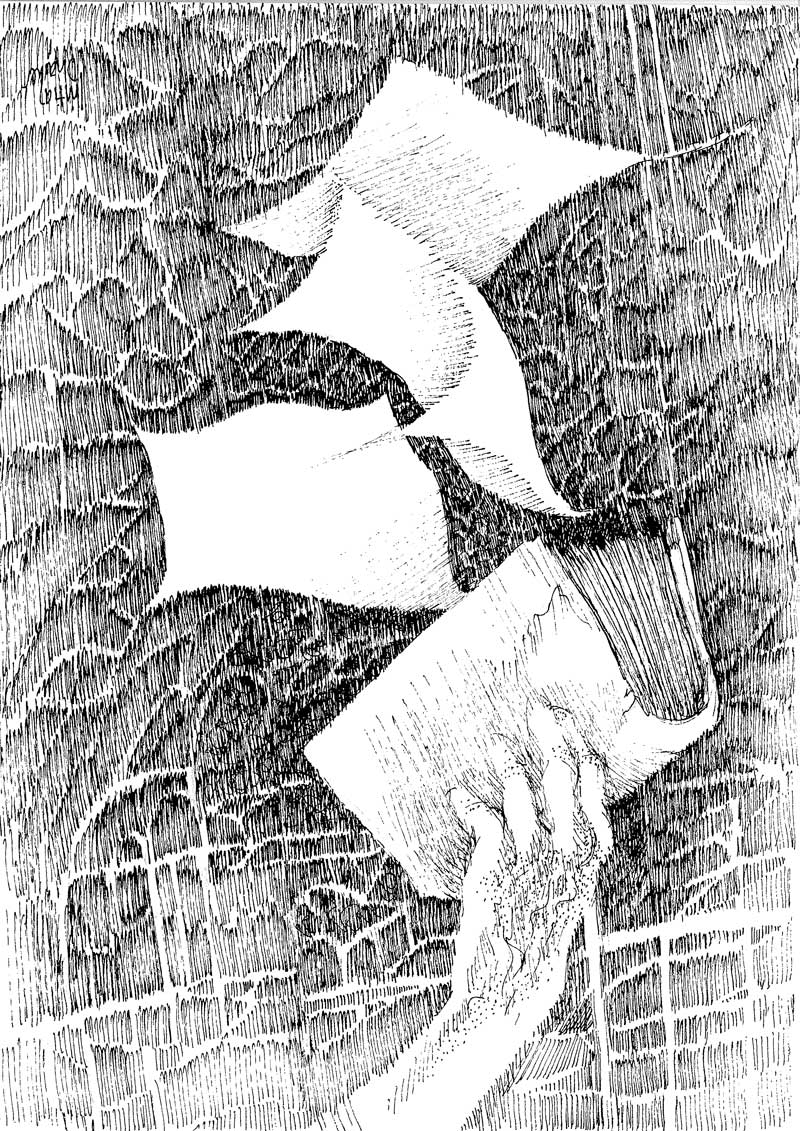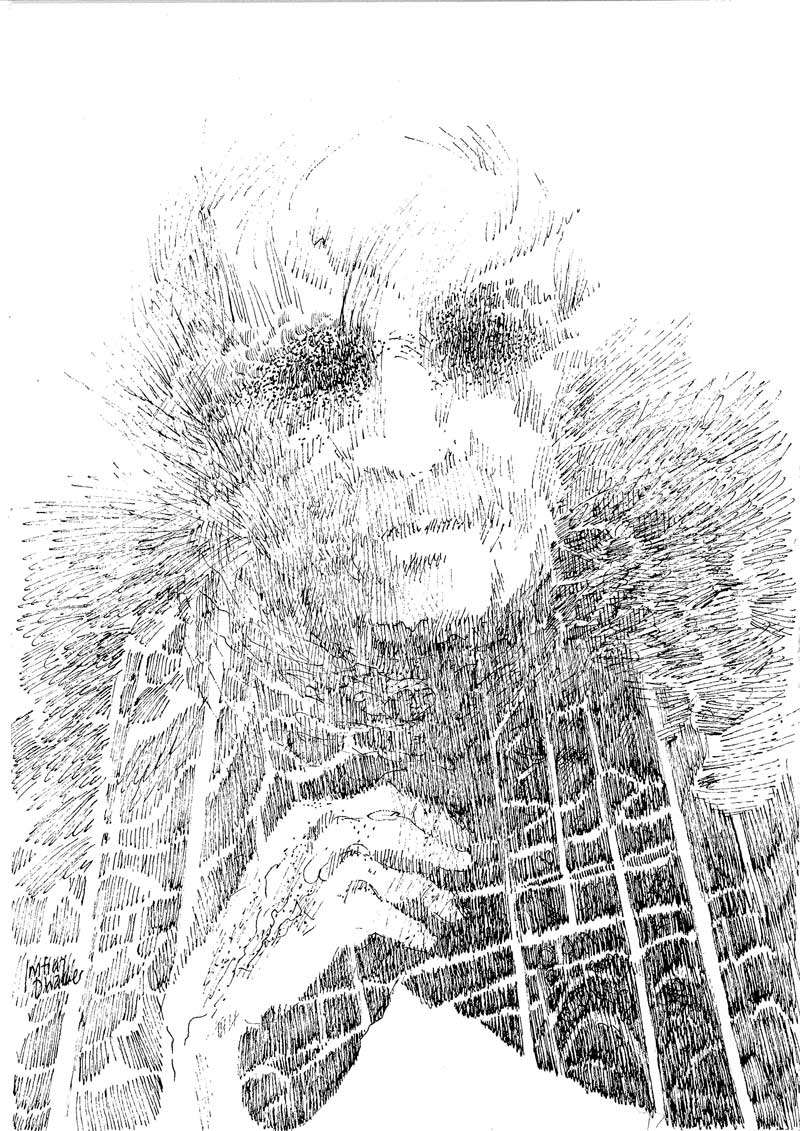Whim
How did it begin?
Where did my whim start
its journey into this
monstrous, magical thing?
I think I travelled
not outward, but within,
and came back
dragging bits of wreckage
from my dreams:
the ragged cloud, the twisted tree,
a concept of eternity,
a man.
Strange,
to have thought up this thing
in its asymmetry,
no longer an abstraction,
quite complete
from collar-bone to rib to hip,
A length of arm, a fingertip.
What was I thinking of
when I made this?
 Naming the Angels
Naming the Angels
And Adam, when the names
of all the angels flowed
sweet as a prayer upon your tongue,
into a flurry, whisper-wing,
what skies split wide and glowed,
what bells were rung
ice-sharp upon the air?
A hush: each one held his breath
before the word enfolded him, strung
up, suspended there
like beads upon your voice;
and each one bowed,
perhaps to you, perhaps under the great
load of this new knowledge,
the real beginning of the road
from flight to fall.
All of them stung
into separateness.
Alone, within
the pride of being named –
the first sin.
Namesake
Adam, your namesake lives
in Dharavi, ten years old. He
has never faced the angels, survives
with pigs that root
outside the door,
gets up at four,
follows his mother to the hotel
where he helps her cut
the meat and vegetables, washes
it all well, watches
the cooking pots over the stove
and waits, his eyelids drooping,
while behind the wall she sells herself
as often as she can before
they have to hurry home.
He very rarely runs
shrieking with other rain-
splashed children
down the sky-paved lane.
He never turns to look at you.
He has no memory
of the Garden, paradise water
or the Tree.
But if he did, Adam, he
would not think to blame you
or even me
for the wrath that has been visited,
inexplicably, on him.
Reflected in sheets of water
at his back
stand the avenging angels
he will never see.
 Adam from New Zealand
Adam from New Zealand
Adam is a journalist,
newly arrived in India
at twenty-six, eager to seek
and understand,
and to record it all first-hand.
So on his way into Bombay
he has decided he must see
the real India in Dharavi.
He wants a guided tour,
to be fitted in his schedule
between the film studio
and a visit to the Chor Bazaar.
He doesn’t understand
why I refuse to take him,
like all the others, lugging
cameras and microphones,
sunguns, recorders, dictaphones.
How can I serve up Zarina
or her brother Adam
to their random cameras?
They will smile shyly.
The aperture will open
to swallow up their souls.
Their mother will send out
for Thums Up, or
from the stall at the corner of the lane,
glasses of hot, sweet tea.
She will put on a brave face,
but everyone in Dharavi will know
the world has come with cameras
to make a side-show
of her poverty.
And will you come back,
in ten years’ time,
with your unidirectional mikes
and your portapacks
to make a record of Zarina’s wedding,
or a video of Adam’s bride?
Adam, your namesake lives in Dharavi.
But I will keep him out of reach
of your greedy camera.
He is too precious for you to see.
Guardians
Strange how the guardians
of our morals
have jellyfish mouths
and jamun eyes.
Funny how your fingers
slither into juicy things
where they don’t belong;
how the pot-belly
sits with your holy abstinence.
Odd how, in those frequent mirrors,
your haloes don’t show up,
and your media-buttered goodness
turns gargoyle.
Dealing with the devil
Arshad said his uncle from Bradford
switched off the TV set one day
right in front of the children’s faces
in the middle of Ice T,
dragged it out, smashed the screen
and carted the corpse away
to the dump,
leaving them sitting there,
the world cast out, all chatter exorcised,
Arif, Zubeida, open-mouthed Nasreen,
their faces left quite bare
as if they had been pulled off.
One devil had been dealt with.
You have to start somewhere,
Arshad’s uncle said.
6 December 1992
This morning I woke
and found my eyelids
turned to glass.
Through closed lids
I saw the whole world
changed to glass.
Glass door, glass lock,
glass gods in makeshift shrines.
When I blink,
glass eyelashes crack.
Outside,
blood runs in transparent veins,
fragile bodies walk the streets.
Through glass clothes
it is clear:
Some are circumcised, some not,
but circumcised or not,
they are all glass.
Glass leaders laugh
and the whole world can see
right through their faces
into their black tongues.
And through the crystal night
the bodies begin to burn.
The right word
Outside the door,
lurking in the shadows,
is a terrorist.
Is that the wrong description?
Outside that door,
taking shelter in the shadows,
is a freedom fighter.
I haven’t got this right.
Outside, waiting in the shadows,
is a hostile militant.
Are words no more
than waving, wavering flags?
Outside your door,
watchful in the shadows,
is a guerrilla warrior.
God help me.
Outside, defying every shadow,
stands a martyr.
I saw his face.
No words can help me now.
Just outside the door,
lost in shadows,
is a child who looks like mine.
One word for you.
Outside my door,
his hand too steady,
his eyes too hard
is a boy who looks like your son, too.
I open the door.
Come in, I say.
Come in and eat with us.
The child steps in
and carefully, at my door,
takes off his shoes.